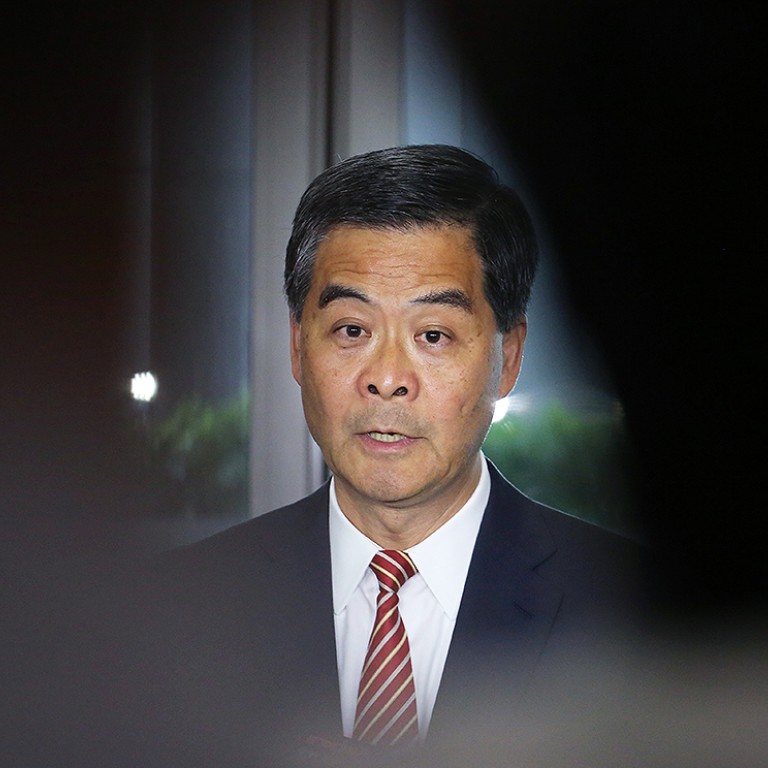
CY Leung’s office hits back at Hong Kong’s ex-governor Chris Patten over political reform
The Chief Executive’s Office has hit back at former governor Chris Patten’s comments on Beijing’s reform plan, after Beijing loyalist Rita Fan Hsu Lai-tai criticised Patten for looking at Hong Kong from a “pre-handover viewpoint”.
The Chief Executive’s Office has hit back at former governor Chris Patten’s comments on Beijing’s reform plan, after Beijing loyalist Rita Fan Hsu Lai-tai criticised Patten for looking at Hong Kong from a “pre-handover viewpoint”.
On Tuesday, Patten said the UK had a continuing “moral and political obligation to ensure that China respects its commitment”, set out in the Sino-British Joint Declaration, to “guarantee Hong Kong’s way of life for 50 years after 1997”.
His comments followed Beijing on Sunday ruling out an open election for Hong Kong’s next leader in 2017.
In a brief statement on Thursday, the office of Chief Executive Leung Chun-ying responded to Patten’s comments.
“First, before Hong Kong’s return to the motherland, all governors of Hong Kong were not elected by Hong Kong people,” it said.
“Second, the Sino-British Joint Declaration does not provide for universal suffrage at all.
“Third, Hong Kong’s constitutional development under the Basic Law is an internal affair of our country and a matter for the central authorities and our people to decide.”

The statement came after Fan, a member of the Standing Committee of the national parliament, the National People’s Congress, said that London had no role to play in the arrival of universal suffrage in Hong Kong.
“There is no mention of universal suffrage in the Sino-British Joint Declaration….I hope Mr Patten could take a look at the Joint Declaration.”
Regarding the selection of chief executive, the Sino-British Joint Declaration states “the chief executive will be appointed by the [Beijing government] on the basis of the results of elections or consultations to be held locally”.
“So, in this sense, I don’t really know what Mr Patten was talking about,” Fan said.
The Joint Declaration also states that Hong Kong should have a high degree of autonomy and executive power, and that personal rights in the territory must be enshrined by law.
“The Hong Kong that Mr Patten understands is the Hong Kong before the handover. Today’s Hong Kong is different,” said Fan.
Fan served in the cabinet of former governor David Wilson, but became a vocal critic of Patten in the 1990s.
Patten’s comments were echoed by the lawmaker heading a British parliamentary inquiry on Hong Kong, who said Beijing appeared to have breached the Joint Declaration with Sunday’s ruling.
Beijing has warned the UK to drop the inquiry.
According to Sunday’s ruling, while Hong Kong could pick its chief executive under one-man one-vote in 2017, the candidates for the job would be chosen by a 1,200-member nominating committee, which would put forward only two or three who had to win the support of over half of its members.
Pan-democrats say it is not genuine universal suffrage as the committee will screen out candidates not wanted by Beijing. They have vowed to vote down the plan in the legislature.
Fan urged the pan-democrats to calm down and not to jump to conclusions, given that the final government plan would not be tabled to the legislature for voting before early next year.
“It is regrettable that the pan-democrats do not know how to communicate with the central government. Anytime when a chance for communication arises, the pan-democrats will in advance make public their demands and vow not to accept anything if all of their demands are not satisfied.
“That is not the way to communicate with the central government.”

